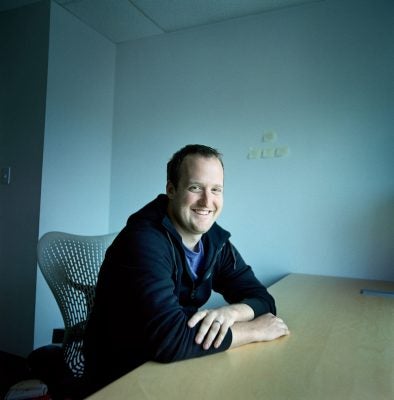
Calling all alumni to come home and ‘change the world’
Kik founder Ted Livingston asks Waterloo alumni to return

Kik founder Ted Livingston asks Waterloo alumni to return
By Brian Caldwell Faculty of Engineering As he works to stake out turf at the centre of the digital mobile world, Kik founder Ted Livingston is appealing to other former Waterloo Engineering students to help develop the enormous potential of the local technology sector.
As he works to stake out turf at the centre of the digital mobile world, Kik founder Ted Livingston is appealing to other former Waterloo Engineering students to help develop the enormous potential of the local technology sector.
“Smart engineers, product designers, come home and help us change the world in Waterloo, where the last great movement in technology in mobile was also created,” he says from the headquarters of Kik Interactive just a few kilometres from the main University of Waterloo campus.
Fiercely proud of his roots as a mechatronics engineering student at Waterloo before he founded the popular chat platform in 2009, Livingston has high praise for the quality of its programs and its graduates.
“I think Waterloo is the best engineering school in the world and that people just don’t know that yet,” he says.
A series of co-op work terms at Waterloo-based BlackBerry more than a decade ago gave Livingston a glimpse into a future where almost everyone would have a smartphone as an integral tool of daily life.
He used that insight to help build Kik into a rare startup unicorn valued at more than US $1 billion, making Livingston one of six founders with ties to Waterloo Engineering to accomplish that feat.
Now determined to build on that success with the introduction of a new cryptocurrency, he says the school, its celebrated co-op program and a growing local technology ecosystem mean Waterloo Region is “uniquely positioned” to produce more world-changing companies like BlackBerry.
To that end, he urges Waterloo Engineering alumni – who he describes as “some of the smartest people in the world” – to return from Silicon Valley and everywhere else they’ve gone to make it happen here.
“We could use the help,” he says. “For all those Waterloo alumni out there, this is a chance to change the world and come home to do it.”
Kik is betting on its new cryptocurrency, called Kin, as the key to turning a profit by giving users a way to earn and spend value in an expanding digital world.
It was introduced last fall with an initial offering that generated US $100 million in sales to 10,000 people in 117 countries. By early 2018, in the midst of a world-wide cryptocurrency boom, its value had soared to US $350 million.
Livingston says the cryptocurrency plan was hatched as company officials gradually realized Kik’s original business model – selling advertising once a user base of sufficient scale had been established – simply wouldn’t work in the face of competition from behemoths like Facebook and Google.
Central to the ambitious new strategy is attracting developers to adopt Kin as a way to make money themselves by innovating, acquiring users, driving demand for the currency and contributing to a growing network of mobile applications.
“I think crypto is going to change the world,” Livingston says, “and I think Waterloo is going to change the world.”
Read more about Kin in eWEAL – Kik’s new cryptocurrency designed to be a game-changer

Read more
How Doug Kavanagh’s software engineering degree laid the foundation for a thriving career in patient care

Read more
Upside Robotics secures new funding to accelerate the future of sustainable farming

Read more
Redefining capstone learning by bringing students, faculty and community partners together to tackle real-world challenges
Read
Engineering stories
Visit
Waterloo Engineering home
Contact
Waterloo Engineering
The University of Waterloo acknowledges that much of our work takes place on the traditional territory of the Neutral, Anishinaabeg, and Haudenosaunee peoples. Our main campus is situated on the Haldimand Tract, the land granted to the Six Nations that includes six miles on each side of the Grand River. Our active work toward reconciliation takes place across our campuses through research, learning, teaching, and community building, and is co-ordinated within the Office of Indigenous Relations.